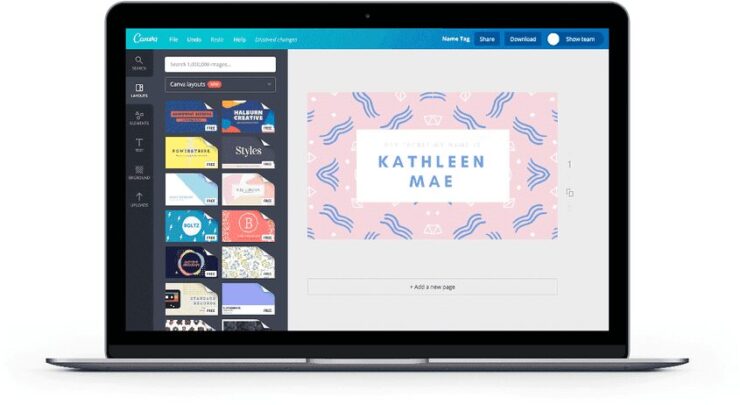Customer engagement is not just a buzzword; it’s the lifeblood of successful businesses. Engaged customers are more loyal, spend more, and become brand advocates – spreading positive word-of-mouth. One surprising yet effective tool for fostering this engagement is something seemingly simple: the name tag.
While these items are often overlooked or dismissed as irrelevant, they play a crucial role in creating meaningful customer connections. Not only do they put a name to the face, but they also humanize staff, encouraging more personable and warm interactions. They act as the first step towards breaking down barriers and fostering an environment of familiarity and trust.
The Power of Personalization

Personalization is a critical aspect of successful customer interactions. In the age of data-driven marketing, customers expect businesses to know who they are, what they want, and to provide a tailored experience. They play a unique role in fulfilling these expectations, offering a personal touch in an increasingly impersonal world.
When a customer sees a staff member with a name tag, it instantly personalizes the interaction. It’s no longer a conversation with a faceless employee, but with “Sarah” or “John”. This humanizes the business interaction, making the customer feel valued and seen.
Many businesses have successfully leveraged this personalization through name plates. Retail giant Walmart, for example, has long embraced the use of these plates, recognizing that they foster a more intimate, personable shopping experience.
Building Trust and Familiarity
Trust is the cornerstone of customer engagement. Customers want to feel safe and understood; they want to trust that the businesses they interact with have their best interests at heart. Name tags contribute significantly to building this trust and fostering a sense of familiarity.
By wearing an identification plate, staff members become more approachable and trustworthy. The customer knows who they are dealing with and feels more comfortable asking questions or voicing concerns. In medical settings, for instance, name stickers can help ease patient anxiety by humanizing healthcare professionals and fostering trust.
Breaking the Ice
Starting a conversation with a customer can be challenging. It requires finesse and tact to strike up a dialogue without seeming pushy or intrusive. Name stickers serve as a valuable tool in initiating these conversations.
With an identification tag, a customer can easily address a staff member, thereby creating an opening for dialogue. Businesses can further leverage this by incorporating fun elements into name tags, like hobbies or favorite books, which can serve as additional conversation starters.
Enhancing Customer-Staff Interactions

Name tags, which you can find if you check this site, aren’t just helpful for customers—they also aid staff members. By knowing a colleague’s name, it becomes easier to collaborate, communicate, and provide cohesive customer service.
Moreover, these plates can help foster a culture of accountability and pride in one’s work. When staff members wear identification stickers, they’re more likely to take ownership of their roles and interactions with customers. In turn, this can lead to more engaged, personable customer service.
Promoting a Sense of Community
Beyond individual interactions, name tags contribute to a larger sense of community. They encourage a more connected, inclusive environment where customers feel they belong.
This sense of community can significantly boost customer engagement and loyalty. For instance, Trader Joe’s, a popular grocery store chain, uses name stickers with unique designs, fostering an atmosphere of individuality and community that customers love.
Overcoming Challenges and Concerns

Despite their benefits, name tags do raise certain concerns, primarily around privacy and security. It’s important for businesses to be respectful of staff comfort levels and personal boundaries.
To address this, companies can implement policies allowing employees to use only first names or nicknames. Businesses can also invest in secure name tags, which are designed to prevent unauthorized duplication, to address security concerns.
Harnessing Technology for Identification Tag Innovation
Technology is constantly evolving, and name tags have not been left behind. The integration of digital displays, NFC technology, and other innovative features have transformed the humble identification tag into a powerful engagement tool. Digital name stickers allow for dynamic content, such as an employee’s name along with their role and special skills. NFC technology can be used to share contact information or trigger certain actions through a simple tap from a smartphone, bridging the gap between the physical and digital world, and making customer interactions even more engaging and meaningful.
Designing Effective Name Tags

An effective identification tag is more than just a name written on a piece of plastic. Thoughtful design can significantly enhance the impact of name tags on customer engagement. Elements such as color, font, logo placement, and shape all contribute to an identification tag’s effectiveness. A well-designed identification tag should be visually appealing, easy to read, and reflective of the brand’s identity. Including a small personal touch, like a favorite hobby, can make interactions more relatable and human.
Measuring Their Impact on Customer Engagement
To understand the true value of name tags in fostering customer engagement, it’s essential to measure their effectiveness. Customer satisfaction surveys, engagement metrics, and employee feedback can provide insights into how these tags are influencing customer interactions. For example, businesses can measure changes in customer satisfaction or repeat purchases after implementing name tags.
Implementing Tag Programs Across Industries
Name tags are versatile and can be adapted for use across various industries. In healthcare, these tags contribute to a sense of trust and security among patients. In retail, they foster a more personalized shopping experience. Educational institutions can use them to create a more inclusive environment. Industry-specific designs and information can be incorporated into identification tags to maximize their impact within different settings.
Name Tags in the Digital Age: Online Engagement

The concept of these tags extends into the digital realm as well. Online platforms and profiles serve as virtual name tags. Usernames, avatars, and profile information can help in establishing identity and fostering connections in the digital world. Businesses can strategically design these virtual identification tags to reflect brand identity and encourage engagement through social media and other online platforms.
Conclusion
Name tags might seem like a small detail, but they can have a big impact on customer engagement. From personalizing customer experiences to fostering trust, breaking the ice, enhancing staff interactions, and promoting a sense of community, the power of the tag is significant.
Businesses looking to improve customer engagement should consider embracing them. While challenges exist, they can be addressed with thoughtful strategies and policies. With their benefits and potential, these tags might just be the secret ingredient to your business’s success.

